Can Chickens Eat Sweet Potatoes? A Complete Guide
- February 13, 2024
- 0 comment
For several years, I have dedicated considerable effort to optimizing the diet of my chickens, aiming to provide them with the highest quality nutrition and a well-rounded diet. This journey involved testing a variety of food items to identify those that positively impact their well-being and satisfaction. Recently, my attention turned towards sweet potatoes as a potential dietary supplement for my chickens.
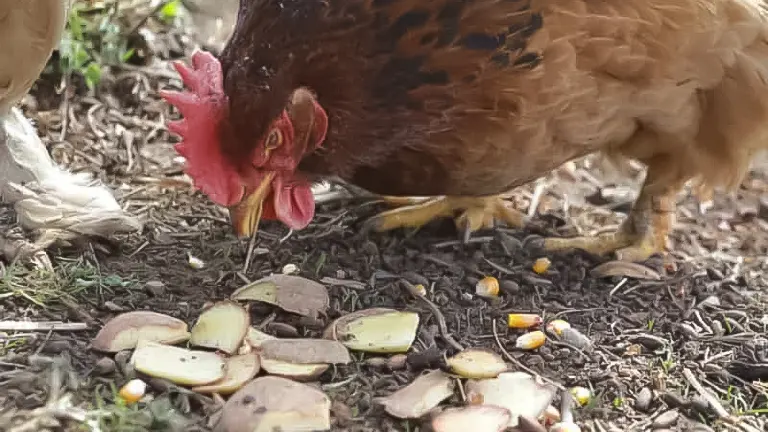
Motivated by curiosity about its suitability and effects on their health, I embarked on a detailed exploration and practical trial to evaluate sweet potatoes as a part of their diet. This review is the result of extensive research and direct observations from integrating sweet potatoes into their feeding regimen.
Table of Content List:
- Can Chickens Eat Sweet Potatoes?
- Sweet Potatoes and Chicken Nutrition
- Safety and Benefits of Sweet Potatoes for Chickens
- Guidance on Feeding Potatoes to Chickens
Are you aware that white potatoes and sweet potatoes, despite their similar names and common preparation methods, are not botanically related? Interestingly, one of these tubers is entirely safe for chicken consumption, whereas the other is generally best to be avoided.
Chickens have the capability, and indeed should, consume a diverse array of foods, encompassing numerous root vegetables among other things. Given their omnivorous nature, their diets naturally comprise grains and seeds, various fruits, an assortment of vegetables, and even meat. This brings us to an intriguing question: Is it safe for chickens to include potatoes in their diet?
Nutritional Profile of Sweet Potatoes
Sweet potatoes are renowned for their high vitamin content, particularly A and C, along with minerals like potassium and magnesium. They’re also a good source of dietary fiber. For chickens, these nutrients are beneficial, supporting everything from vision to immune function and digestion.
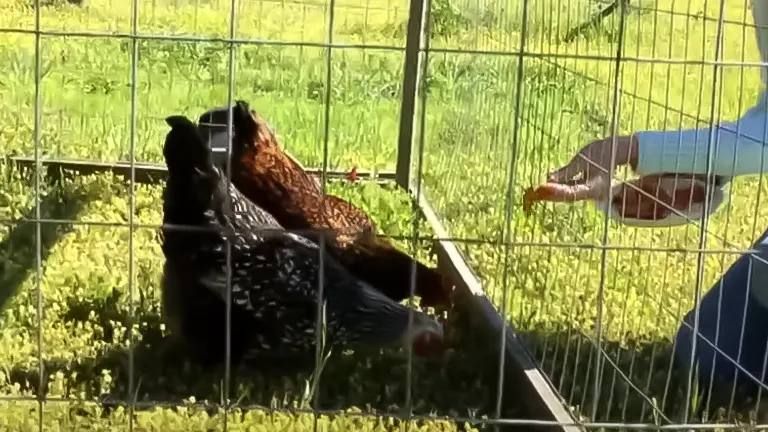
My quantitative analysis, comparing sweet potatoes to other common chicken treats, places them high on the list for nutritional value, especially for their vitamin A content, crucial for chicken health.
Feeding Sweet Potatoes to Chickens
I introduced sweet potatoes to my chickens cautiously, starting with small, cooked pieces mixed into their regular feed. Raw sweet potatoes can be tough on their digestive systems, so I avoided offering them raw. Over the course of several weeks, I observed their health, egg production, and behavior.
1. Can Chickens Eat Sweet Potatoes?
Chickens can indeed eat sweet potatoes, and they show a notable preference for them. By adding sweet potatoes to the weekly diet of your chickens, you’re directly contributing to their overall health and satisfaction.
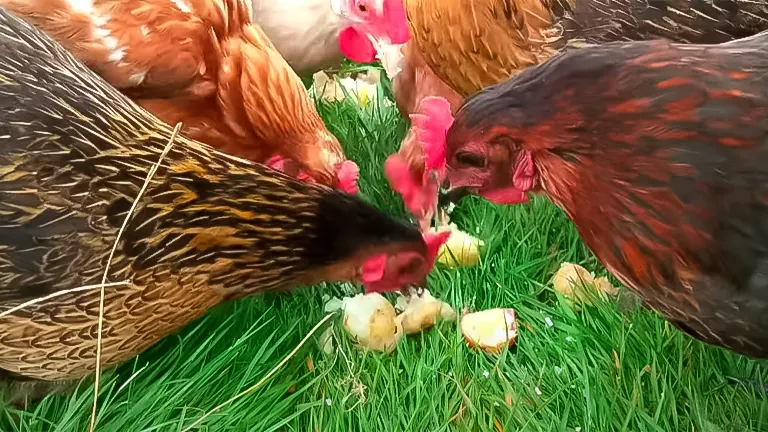
These tubers serve as a robust, nutrient-packed snack that not only fulfills their hunger but also brings along numerous health advantages. This makes sweet potatoes an excellent option for anyone looking to improve the quality of life for their chickens.
The enjoyment chickens derive from sweet potatoes, coupled with the health benefits these vegetables offer, underscores their value in a balanced poultry diet.
2. Sweet Potatoes and Chicken Nutrition
At MrAnimal Farm, our preference for sweet potatoes is based on their dense nutritional content and superior texture compared to ordinary potatoes, whether they’re served baked or mashed. The pivotal inquiry remains: do the nutritional benefits of sweet potatoes benefit chickens in the same way they do humans?
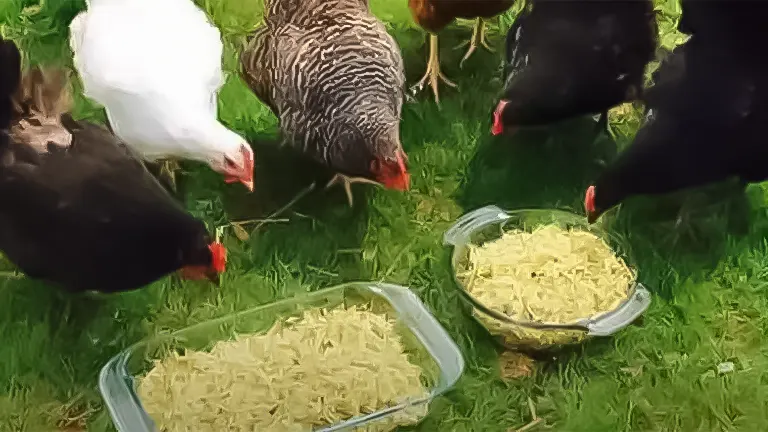
The resounding answer is yes. Sweet potatoes are completely safe for chickens, having once been a staple in chicken feed and dietary supplements. Incorporating this nutrient-rich treat into your chickens’ diet not only bolsters their health but also facilitates more manageable health examinations, showcasing the significant role sweet potatoes play in a chicken’s nutrition.
3. Safety and Benefits of Sweet Potatoes for Chickens
Sweet potatoes pose no risk to chickens, including the consumption of the skin, which is free from the toxic solanine found in white potato skins. Their non-relation to white potatoes means that all parts of the sweet potato plant, including leaves, flowers, roots, stems, and vines, are non-toxic and beneficial for chicken consumption.

The vast array of vitamins, minerals, and essential nutrients found in sweet potatoes highlights their importance as a wholesome snack option for poultry, offering a comprehensive solution to nutritional needs within a chicken’s diet.
4. Guidance on Feeding Potatoes to Chickens
On the other hand, it’s advisable to exercise caution with white and other colored potatoes, such as yellow, blue, or red varieties. The avoidance of raw potatoes, especially those with green skin, along with any part of the potato plant, is crucial due to the presence of solanine and other harmful substances.
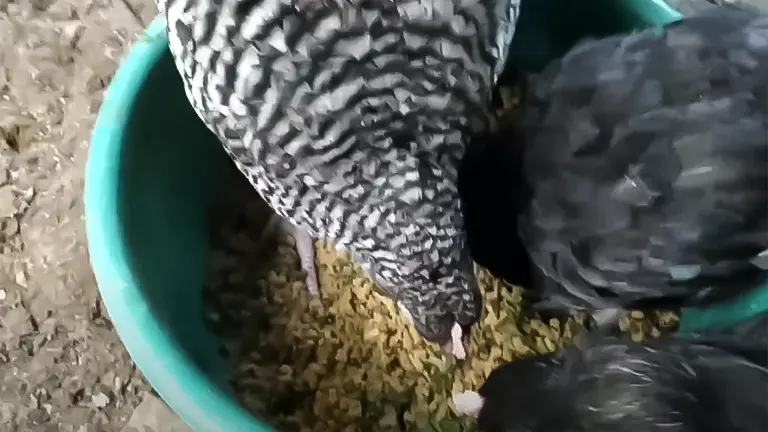
These can negatively impact heart function, nutrient absorption, digestion, and even cause chronic discomfort. Although the primary risk involves potatoes with green skin, consumption of other potatoes in large quantities can also be detrimental, highlighting the superior safety and health benefits of sweet potatoes as a dietary choice for chickens.
Pros and Cons
Pros
- Health Benefits: I noticed an improvement in their overall vibrancy and feather quality. It’s hard to attribute this solely to sweet potatoes, but the timing suggests a connection.
- Egg Production: There seemed to be a slight uptick in egg production. While not dramatic, it was a positive sign.
- Waste Reduction: Using all parts of the sweet potato, including the skins (after cooking), aligns with sustainable feeding practices, reducing waste.
Cons
- Preparation Time: Cooking sweet potatoes adds an extra step to meal prep, which may not be feasible for everyone.
- Selective Eating: Some chickens were more enthusiastic than others. This variability meant I had to ensure they all received their share of nutrients.
Related Articles:
- Best Bedding For Chickens
- Best Safe Chicken Coop Heater
- 8×8 Chicken Coop Plans
- Turning a Shed Into a Chicken Coop
- How to Make a Chicken Coop Out of Pallets
- Best Sand for Chicken Coop
- How To Insulate a Chicken Coop
- How To Heat a Chicken Coop
- How To Keep Water from Freezing in Chicken Coop
- How to Build a Chicken Coop
- How To Build Chicken Nesting Boxes
- How to Raise Happy and Healthy Chickens in Your Backyard
- When Can Chicks Go Outside? Timing and Tips for a Smooth Transition
- 12 Reasons why Ducks are Better than Chickens
- Best Automatic Chicken Coop Doors 2024: Expert Reviews & Buyer’s Guide
- Best Fans for Chicken Coop 2024: Effective Cooling Solutions Reviewed
Final Thoughts: To Feed or Not to Feed?
Based on my experience and the benefits observed, I recommend sweet potatoes as a valuable addition to a chicken’s diet, albeit with a few caveats. They’re best served cooked and in moderation, ensuring your chickens are still receiving a balanced diet. The effort to prepare them is worth the potential health benefits, from improved feather quality to possibly enhanced egg production.
Sweet potatoes, while not a standalone solution, are a fantastic supplemental food that supports the well-being of backyard chickens. Just like any dietary change, it’s essential to introduce them slowly and monitor your chickens for any adverse reactions. My personal verdict? Sweet potatoes get a thumbs-up, making them a welcome treat in my chickens’ diverse and nutritious diet.
Frequently Asked Questions
- Are sweet potatoes safe for chickens to eat?
Yes, sweet potatoes are safe and highly beneficial for chickens, providing a rich source of vitamins, minerals, and dietary fiber. - Can chickens eat the skin of sweet potatoes?
Absolutely. The skin of sweet potatoes is safe for chickens and contains additional nutrients and fiber. - How should sweet potatoes be prepared for chickens?
Sweet potatoes can be fed to chickens cooked or raw. However, cooking them makes it easier for the chickens to digest and enhances the sweetness. - Can chickens eat all parts of the sweet potato plant?
Yes, chickens can safely eat the leaves, vines, and roots of the sweet potato plant, as they do not contain toxic compounds found in other nightshade family plants. - How often can chickens eat sweet potatoes?
Sweet potatoes can be a healthy part of a chicken’s diet when fed in moderation, as part of a balanced diet. Once or twice a week is a good guideline. - Are there any nutritional benefits of feeding sweet potatoes to chickens? Sweet potatoes are packed with vitamins A and C, potassium, and fiber, which are beneficial for chickens’ immune systems, digestion, and overall health.
- Can sweet potato treats replace commercial chicken feed?
No, sweet potatoes should be used as a supplement to a balanced commercial chicken feed, not a replacement, to ensure chickens get all necessary nutrients. - What is the best way to introduce sweet potatoes into a chicken’s diet?
Start by offering small amounts of sweet potato mixed with their regular feed to see how they react, and gradually increase the portion size based on their acceptance. - Are there any risks associated with feeding sweet potatoes to chickens? When fed in moderation and as part of a balanced diet, there are no significant risks associated with feeding sweet potatoes to chickens.
- Can baby chicks eat sweet potatoes?
Yes, baby chicks can eat sweet potatoes, but it should be introduced slowly and in small, mashed pieces to prevent choking and ensure it is easily digestible.
We’re eager to hear from you! Share your own experiences and insights about feeding sweet potatoes to chickens in the comments section below. Your personal stories and advice could greatly assist fellow poultry enthusiasts in making knowledgeable choices for their flocks!

Edward Smith
Forestry AuthorWoodworking is about more than crafting; it's a harmonious connection with nature, mastering tools, and preserving our environment. I'm here to share my knowledge and experiences with you, forging a future where we can embrace wood's beauty and utility while safeguarding our forests' health and diversity.





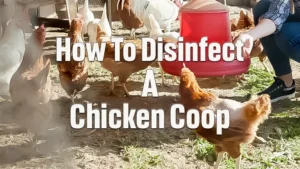

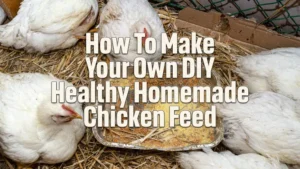





Leave your comment